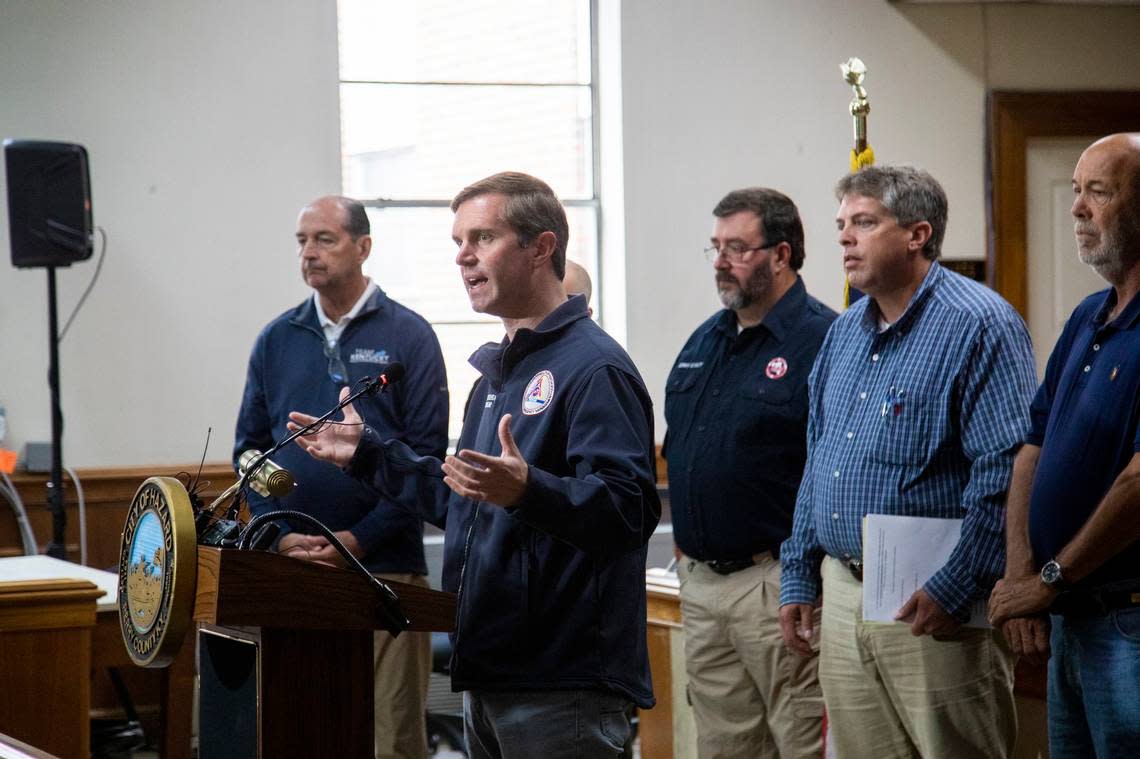‘FEMA heard us.’ Changes could help more Eastern Kentuckians get aid after flooding

Days after the Federal Emergency Management Agency was slammed by elected leaders in Kentucky for denying too many claims following catastrophic flooding in Eastern Kentucky, Gov. Andy Beshear announced Monday changes he believes could improve results.
“I think FEMA heard us,” he said. “And that’s everybody. I think they see the stories of people that are suffering. I think they hear the frustration of lawmakers. This was them going back and looking. It’s the people on the ground here pushing the rest of FEMA.”
In addition to calling every single person who saw their claim denied, FEMA has also launched a text line and authorized workers on the ground in Eastern Kentucky to authorize claims, Beshear said.
Beshear was critical of the federal agency in a news briefing last week, saying too many Kentuckians in dire need of help were being denied outright. State Sen. Brandon Smith, R-Hazard, also released a statement slamming FEMA for “inaction, denials and an indication of surprisingly inadequate financial assistance.”
The governor urged people who saw their claims denied to pick up their phones. Of the 4,006 calls FEMA has made, Beshear said only 1,508 have answered.
FEMA is also launching a texting program Tuesday, Beshear said, which will help recipients schedule an appointment to go over their claim. Beshear said he believed this to be the first time in the nation FEMA has provided such an option.
Additionally, FEMA employees in the local disaster recovery centers now have the authority to approve claims, which he noted was a significant change because it removes some of the mid-level where applications had previously been denied.
“Before, they would take all your information. They would get your application ready,” Beshear said. “They’d say it looks good and they would have to send it on. Now, people on the ground, that you can go in to look eye to eye with, have the ability to approve claims.”
Beshear cautioned that these steps still may not be enough to resolve the issues that have plagued FEMA’s process so far, but the approval rate in the days ahead should let officials know if it’s moved the needle.
Not long after Beshear spoke, Brett Howard, a federal coordinating officer for FEMA, said during a separate news conference that the agency has approved some level of housing assistance for 63 percent of the people who applied so far as a result of the flooding in Eastern Kentucky.
FEMA officials said people have been turned down for a variety of reasons, including insufficient damage to their property; not being available for contact during an inspection; and problems verifying occupancy and identification.
In some cases, people who applied didn’t have property damage or didn’t live in one of the 12 counties designated for individual assistance.
But Howard said the agency wants to help everyone who is eligible get as much money as possible, and urged flood victims — including people who have been denied — to call FEMA at 800-621-3362 or go to one of the local disaster recovery centers.
“The first denial does not need to be your final answer from FEMA,” he said. “Know this — we’re here to help and we’re doing all we can to help Kentuckians recover and we will not leave until our mission is finished.”
Howard said people who have been denied because they have insurance may be able to get money from FEMA if insurance didn’t cover all the loss.
More than 170 people have received the maximum benefit allowed by law, which is $37,900, while the average amount so far has been $8,458, Howard said.
Howard said FEMA has made more than $36 million in grants so far to uninsured people.
Howard said some applications that haven’t been approved yet are still in the pipeline, and that people who have been denied may be able to cure the problem and get approved later.
Still, a Kentucky county official who went through a flood last year said many people who lost everything or suffered significant damage to property in the recent flooding are likely to come away unsatisfied with the amount of money FEMA can provide.
The FEMA help was valuable, but it doesn’t cover all costs, said Lee County Judge-Executive Chuck Caudill.
“Everybody wanted more,” after flooding in the county in March 2021, Caudill said. “They definitely are not designed to make you whole.”
Assistance from the American Red Cross, faith-based organizations and donors also was key to helping people get back on their feet, Caudill said.
Record rainfall in late July brought flooding that left 39 people dead and hundreds more without homes across multiple counties of Eastern Kentucky.
